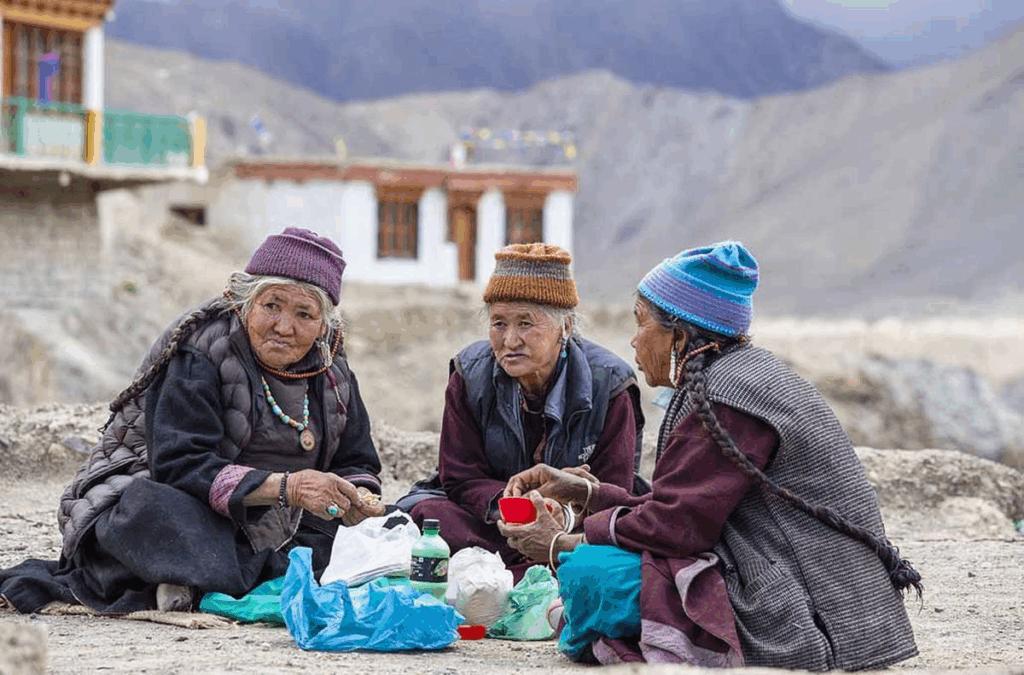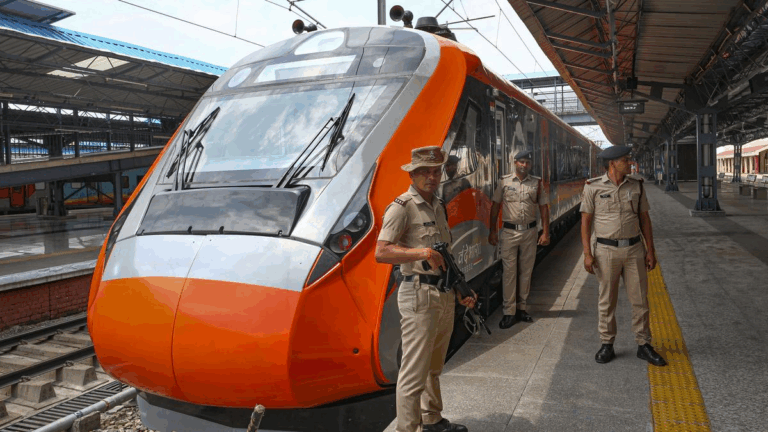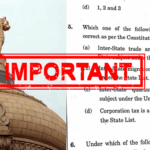Ladakh’s New Quota and Domicile Policy: Implications for Governance and Inclusion
Why in the News?
In a landmark move, the Union Government notified a set of regulations for the Union Territory (UT) of Ladakh on June 4, 2025. These notifications, which address domicile eligibility, reservation in government jobs, official languages, and the structure of local governance through hill councils, are seen as a significant step toward meeting longstanding demands by civil society groups in the region for constitutional and developmental safeguards.

President Droupadi Murmu approved four key regulations:
- The Union Territory of Ladakh Reservation (Amendment) Regulation, 2025
- The Ladakh Official Languages Regulation, 2025The Ladakh Civil Services
- Decentralisation and Recruitment (Amendment) Regulation, 2025
- The Ladakh Autonomous Hill Development Councils (Amendment) Regulation, 2025
These notifications come against the backdrop of protests, shutdowns, and continued agitation in Ladakh following the abrogation of Article 370 and the reorganisation of Jammu and Kashmir in August 2019, which left Ladakh as a UT without a legislature.
Background: Ladakh Post-August 2019
Ladakh was carved out as a separate Union Territory on October 31, 2019, following the abrogation of Article 370. While initially welcomed as long-awaited administrative recognition of its unique identity, the move soon generated unease.
Key demands by Ladakhi groups include:
- Statehood with an elected legislature
- Sixth Schedule inclusion to protect land and cultural identity
- Job reservations for local youth
- Separate parliamentary representation for Leh and Kargil
While Articles 370 and 35A protected land and job rights in the erstwhile state of Jammu and Kashmir, their removal triggered concerns about demographic change, loss of cultural heritage, and economic marginalisation.
In response, two umbrella groups, the Leh Apex Body (LAB) and the Kargil Democratic Alliance (KDA), were formed. They have consistently demanded constitutional guarantees and tribal status for the region, leveraging their political influence and public support.
Key Features of the New Notifications
- Domicile Criteria Redefined: The UT of Ladakh Reservation (Amendment) Regulation, 2025 defines “domicile” as someone who has continuously resided in Ladakh for 15 years from its foundation day (October 31, 2019). This effectively sets the cutoff at October 31, 2034.
- Exemptions: Children of Central Government officials serving in Ladakh can also qualify as domiciles if they meet the residence criteria.
- This replaces the Jammu and Kashmir-centric provision and aligns with Ladakh’s independent administrative identity.
Job Reservation Uplifted to 95%
One of the most groundbreaking provisions is that reservation in government jobs can now go up to 85%, excluding 10% for EWS and 1% for SCs, raising the total potential reservation to 95%, among the highest in India.
Proposed category-wise breakdown:
- 80% for Scheduled Tribes (which comprise ~80% of Ladakh’s population)
- 4% for people residing along the LoC/LAC
- 1% for Scheduled Castes
- 10% for Economically Weaker Sections (EWS)
This move effectively localises employment and ensures meaningful participation of Ladakhis in public administration.
Women’s Reservation in Hill Councils
The Ladakh Autonomous Hill Development Councils (Amendment) Regulation, 202,5, introduces 33% reservation for women in council seats on a rotational basis. This is significant for a traditionally patriarchal region and aligns with national efforts to promote gender inclusion in governance.
Official Languages Recognised
The Ladakh Official Languages Regulation, 2025, formalises the following five official languages:
- English
- Hindi
- Urdu
- Bhoti
- Purgi
The regulation also promotes the preservation and development of other native dialects, aligning with Article 29 of the Constitution, which protects the cultural and linguistic rights of minorities.
Decentralised Recruitment Mechanism
The Ladakh Civil Services Decentralisation and Recruitment (Amendment) Regulation, 2025 clarifies:
- Recruitment for both Gazetted and Non-Gazetted posts within Ladakh
- The institutionalisation of decentralised recruitment to allow flexibility in local hiring processes, which previously remained ambiguous in the absence of a state-level Public Service Commission
Legal and Constitutional Context
- The new policies are enabled by Section 96 of the Jammu and Kashmir Reorganisation Act, 2019, which allows the President to make regulations for Union Territories.
- However, the substitution of the J&K Reservation Act, 2004, with Ladakh-specific provisions reflects the need to “territorialise governance” in line with the region’s distinct demography and geography.
- Yet, the absence of statehood or legislative autonomy still leaves Ladakhis with limited say in policymaking core grievance that remains unresolved.
Challenges
Lack of Legislative Autonomy
The regulations were centrally notified, bypassing any local legislative process, as Ladakh lacks a legislature. Civil society groups fear that this top-down governance model may lack sustainability and inclusiveness over time.
- Absence of Sixth Schedule Status
- Although Scheduled Tribes constitute nearly 80% of Ladakh’s population, the region is not included in the Sixth Schedule, which would have guaranteed:
- Tribal self-governance
- Protection of land and natural resources
- Local legislative powers
While the new domicile and reservation rules are welcome, they do not constitutionally protect Ladakhi identity and resources as Sixth Schedule inclusion would.
Operational Delays in Notification of Rules
Though the overarching regulations have been notified, the implementation rules (e.g., domicile application processes, exact reservation quotas) are still awaited, raising the risk of bureaucratic delays and administrative ambiguity.
Perceived Exclusion of Kargil Aspirations
Some voices from Kargil, particularly within the KDA, argue that decision-making remains Leh-centric. The rotational provision for women’s reservation in councils may not adequately address the gender participation challenges unique to Kargil.
Central Appointments vs. Local Recruitment
Many key administrative positions in Ladakh- such as in the police and civil services- are still filled through central deputation, not by local cadres. This undermines the localisation goals that the new rules aim to achieve.
Significance and Implications
Strengthening Local Empowerment
Redefining domicile and significantly enhancing ST reservations reflect a tribal-first governance model, directly addressing local employment concerns and building public trust.
Gender Inclusivity
The introduction of a one-third reservation for women in hill councils marks a progressive shift and can serve as a precedent for other hill regions.
Language and Identity Recognition
- The inclusion of Bhoti and Purgi in official use affirms cultural identity and supports the preservation of endangered languages.
- Security and Strategic Implications
- Located along sensitive borders with China and Pakistan, ensuring the socio-economic well-being of locals is crucial to India’s national security strategy in the region.
Way Forward
- Grant Statehood or Legislative Powers
- To ensure true democratic governance, Ladakh must be granted Statehood or at least a legislative assembly with powers akin to Delhi or Puducherry.
- Include Ladakh in the Sixth Schedule
Given its tribal composition, Parliament should consider bringing Ladakh under the Sixth
Schedule to constitutionally safeguard:
- Land ownership
- Resource control
- Cultural preservation
Fast-track Notification of Implementation Rules
The Centre should immediately release detailed Rules under each Regulation to ensure clarity regarding:
- Domicile certification
- Job recruitment mechanisms
- Language promotion policies
Establish a Dedicated Ladakh Public Service Commission (PSC)
A regional PSC would streamline recruitment and enhance transparency, reducing dependence on central agencies.
Hill Councils should be granted more autonomy in:
- Taxation
- Land regulation
- Planning and budgeting
Additionally, regular Gram Sabha meetings should be institutionalised to empower Panchayati Raj institutions.
Build Trust Through Transparent Dialogue
Ongoing engagement with the Leh Apex Body and the Kargil Democratic Alliance through structured dialogue can help bridge administrative intent with public aspirations.
Conclusion
The 2025 notifications for Ladakh mark a watershed moment in centre-local relations. They symbolise a growing recognition of regional identity while aiming to balance tribal rights, cultural preservation, and national unity.However, without accompanying structural reforms such as legislative autonomy or Sixth Schedule inclusion, these administrative policies may remain insufficient in fulfilling the constitutional and democratic aspirations of Ladakhis. For Ladakh to emerge as a model of sustainable, inclusive, and secure frontier governance, New Delhi must move beyond incrementalism. Only through deeper structural empowerment can protest transform into participation, and marginalisation into ownership.
MAIN PRACTICE QUESTION
Question: Critically examine the recent regulations notified by the Union Government for the Union Territory of Ladakh in June 2025. To what extent do these reforms address the region’s demand for constitutional and developmental safeguards? What challenges remain in achieving inclusive and sustainable governance in Ladakh?
PRELIMS PRACTICE QUESTION
Question: The constitutional provision that enables the President to make regulations for Union Territories like Ladakh is found under:
A. Article 356
B. Article 239A
C. Section 96 of the Jammu and Kashmir Reorganisation Act, 2019
D. Article 371D
Correct Answer: C







